
A Clockwork Orange is a 1971 dystopian crime film adapted, produced, and directed by Stanley Kubrick, based on Anthony Burgess's 1962 novel. It employs disturbing and violent themes to comment on psychiatry, juvenile delinquency, youth gangs, and other social, political, and economic subjects in a dystopian near-future Britain.
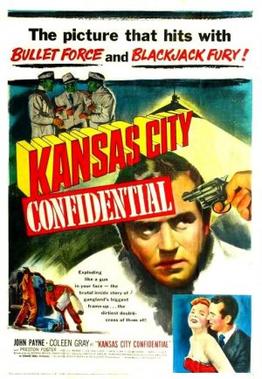
Kansas City Confidential is a 1952 American film noir and crime film directed by Phil Karlson starring John Payne and Coleen Gray. The film was released in the United Kingdom as The Secret Four. Karlson and Payne teamed a year later for 99 River Street, another film noir, followed by Hell's Island, a film noir in color.

Howard da Silva was an American actor, director and musical performer on stage, film, television and radio. He was cast in dozens of productions on the New York stage, appeared in more than two dozen television programs, and acted in more than fifty feature films. Adept at both drama and musicals on the stage, he originated the role of Jud Fry in the original 1943 run of the Rodgers and Hammerstein musical Oklahoma!, and also portrayed the prosecuting attorney in the 1957 stage production of Compulsion. Da Silva was nominated for a 1960 Tony Award as Best Featured Actor in a Musical for his work in Fiorello!, a musical about New York City mayor LaGuardia. In 1961, da Silva directed Purlie Victorious, by Ossie Davis.
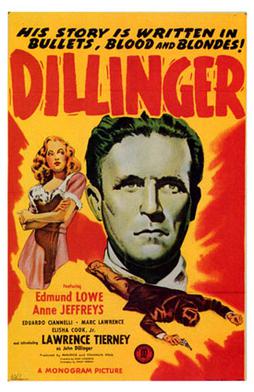
Dillinger is a 1945 gangster film telling the story of John Dillinger.
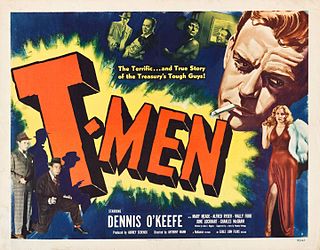
T-Men is a 1947 semidocumentary and police procedural style film noir about United States Treasury agents. The film was directed by Anthony Mann and shot by noted noir cameraman John Alton. The production features Dennis O'Keefe, Mary Meade, Alfred Ryder, Wallace Ford, June Lockhart and Charles McGraw. A year later, director Mann used the film's male lead, Dennis O'Keefe, in Raw Deal.
The Phenix City Story is a 1955 American film noir crime film directed by Phil Karlson for Allied Artists, written by Daniel Mainwaring and Crane Wilbur and starring John McIntire, Richard Kiley, and Kathryn Grant. It had a triple premiere held on July 19, 1955 in Phenix City, Alabama, Columbus, Georgia, and Chicago, Illinois.

RoboCop is a 1988 superhero animated series based on the 1987 movie of the same name. The series was produced by Marvel Productions in association with Orion Pictures Corporation, and was syndicated by New World Television as part of the Marvel Action Universe programming block.
The Fastest Gun Alive is a 1956 American western film directed by Russell Rouse and starring Glenn Ford, Jeanne Crain, and Broderick Crawford. It was produced by Metro-Goldwyn-Mayer.
The East Harlem Purple Gang was a gang and organized crime group in New York City consisting of Italian-American hit-men and heroin dealers who were semi-independent from the Italian-American Mafia and, according to federal prosecutors, dominated heroin distribution in East Harlem, Italian Harlem, and the Bronx during the 1970s and early 1980s. Though mostly independent of the Mafia and not an official Mafia crew, the gang was originally affiliated with and worked with the Lucchese crime family and later with the Bonanno crime family and Genovese crime family. It developed its "closest ties" with the Genovese family, and its remnants or former members became part of the Genovese family's 116th Street Crew.
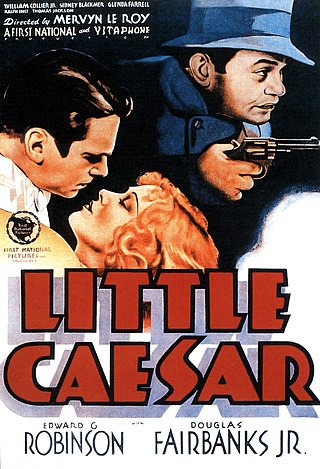
Little Caesar is a 1931 American pre-Code crime film distributed by Warner Brothers, directed by Mervyn LeRoy, and starring Edward G. Robinson, Douglas Fairbanks Jr. and Glenda Farrell. The film tells the story of a hoodlum who ascends the ranks of organized crime until he reaches its upper echelons.

Thomas A. Curran, was an Australian-born American actor on the stage and in motion pictures. Between 1915 and 1941 he appeared in 60 films, the last of which was Citizen Kane, in which he played the uncredited role of Theodore Roosevelt in the "News on the March" newsreel sequence.
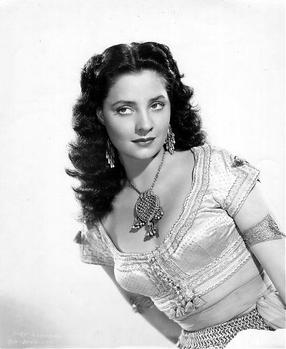
Jody Lawrance (born Nona Josephine Goddard; October 19, 1930 – July 10, 1986) was an American actress who starred in many Hollywood films during the 1950s through the early 1960s.

Vigilante, later released on video as Street Gang, is a 1982 American vigilante film directed by William Lustig and starring Robert Forster and Fred Williamson. Lustig came upon the idea for the film through a news article about "a group of blue collar workers in southern New Jersey who had organized to fight crime in their neighborhood".

The Purple Gang, also known as the Sugar House Gang, was a criminal mob of bootleggers and hijackers composed predominantly of Jewish gangsters. They operated in Detroit, Michigan, during the 1920s of the Prohibition era and came to be Detroit's dominant criminal gang. Excessive violence and infighting caused the gang to destroy itself in the 1930s.

Cry of the Hunted is a 1953 American crime film noir directed by Joseph H. Lewis. The drama features Vittorio Gassman, Barry Sullivan and Polly Bergen.

Street Kings 2: Motor City is a 2011 American action thriller film starring Ray Liotta and directed by Chris Fisher. It is a stand-alone sequel to the 2008 film Street Kings starring Keanu Reeves. The film was released direct-to-DVD in the United States on April 19, 2011.
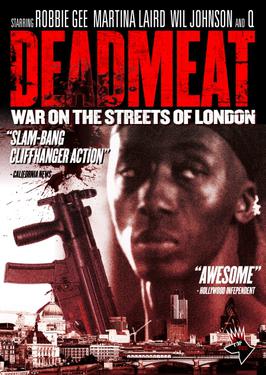
Deadmeat is a 2007 British urban crime drama thriller film written, directed, produced by, and starring Q, aka Kwabena Manso. The film is about a man who has just been released from prison and sets out to exact violent revenge against the gang who murdered his brother.

Torchy Blane in Chinatown is a 1939 American mystery film directed by William Beaudine and starring Glenda Farrell and Barton MacLane. Released on February 4, 1939, it is the seventh film in the Torchy Blane film series by Warner Bros. and is followed by Torchy Runs for Mayor (1939).
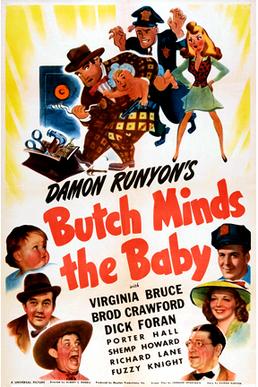
Butch Minds the Baby is a 1942 American comedy film directed by Albert S. Rogell and written by Leonard Spigelgass, based on the short story of the same name by Damon Runyon. The film stars Virginia Bruce, Broderick Crawford, Dick Foran, Porter Hall, Richard Lane and Shemp Howard. The film was released on March 20, 1942, by Universal Pictures.

Judas and the Black Messiah is a 2021 American biographical crime drama film directed and produced by Shaka King, who wrote the screenplay with Will Berson, based on a story by the pair and Kenny and Keith Lucas. The film is about the betrayal of Fred Hampton, chairman of the Illinois chapter of the Black Panther Party in the late-1960s Chicago, by William O'Neal, an FBI informant. Jesse Plemons, Dominique Fishback, Ashton Sanders, Darrell Britt-Gibson, Lil Rel Howery, Algee Smith, Dominique Thorne, and Martin Sheen also star.

















